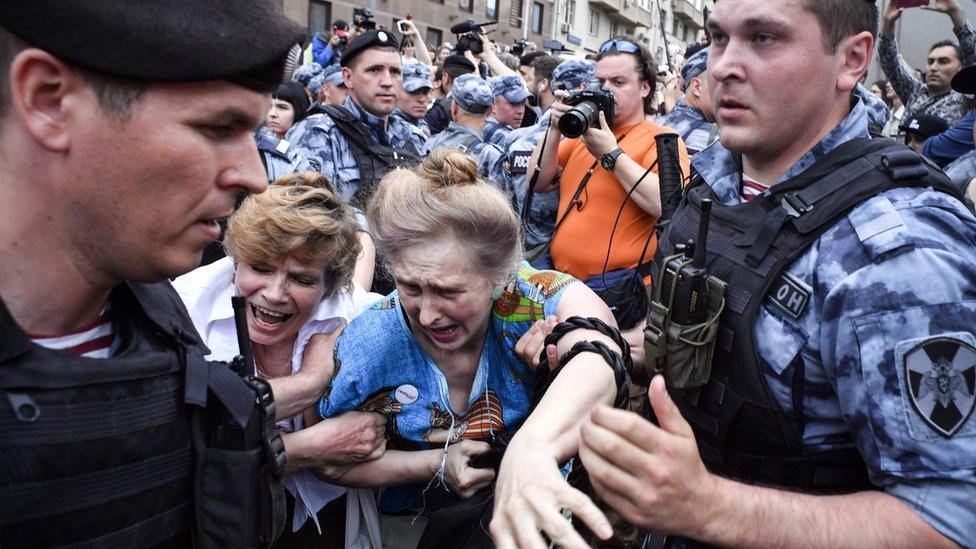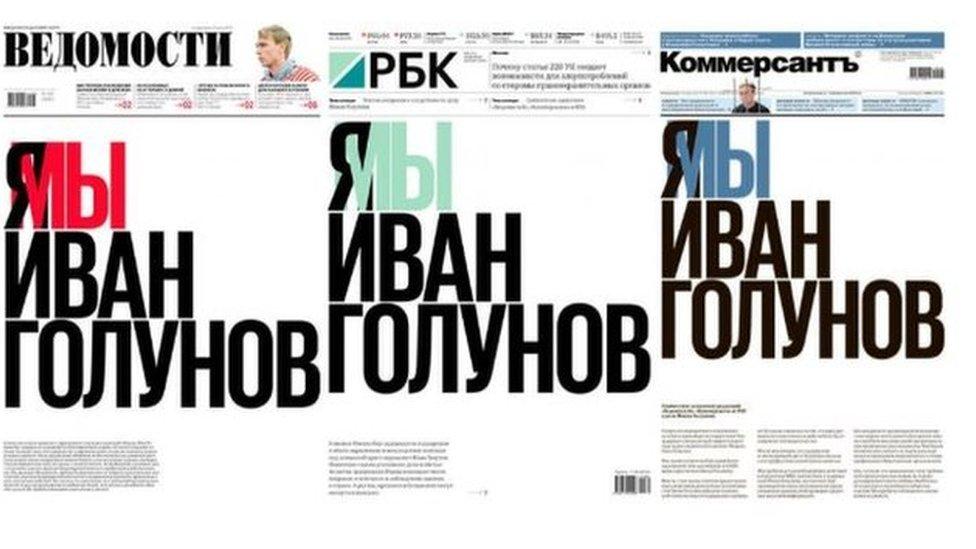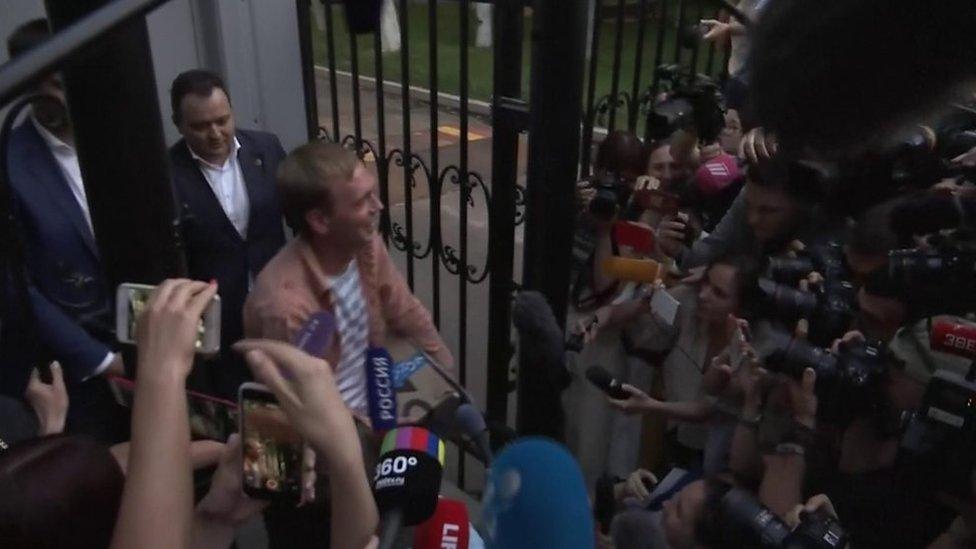Ivan Golunov's Russian release: Why this case matters
- Published
Ivan Golunov was given a warm welcome after his release
These have been a remarkable few days in Russia and, as Russians mark a national holiday, many will feel the freeing of journalist Ivan Golunov has given them something extra to celebrate.
From the moment the news broke on Friday that the investigative reporter for the Latvia-based Meduza news agency had been arrested on drugs charges, it was clear this was an extraordinary case.
At the time of his arrest, Golunov was not yet a household name in Russia.
But the stories he wrote about - from corruption in high places to violent turf wars over the funeral business - have resonance for ordinary Russians.
So did the fact that he was picked up by the police, kept incommunicado, beaten up and wrongly accused of possessing and supplying drugs.
Allow X content?
This article contains content provided by X. We ask for your permission before anything is loaded, as they may be using cookies and other technologies. You may want to read X’s cookie policy, external and privacy policy, external before accepting. To view this content choose ‘accept and continue’.

His detention raised fundamental questions, not just for journalists but for all Russians.
If you dare to speak out, and stand up to those in power, will you be safe? Will your basic rights be guaranteed?
Not always, was clearly the answer from the many people in Moscow who decided to take a stand this week to demand his release, and who returned to the streets to face arrest on Wednesday.
Do Russians care about corruption?
"Today it's him and tomorrow it could be me," said Mikhail Rubin, a fellow journalist from investigative news site Proekt.
Ivan Golunov is a brave and committed reporter. I know because he worked for me for three years, when I was editor-in-chief of independent online media outlet Slon.ru.

Police arrested more than 200 protesters in Moscow on Wednesday - the day after Ivan Golunov's release
His focus, some might say his obsession, was chasing stories about corruption in Russia's ruling and business elites.
He would spend hours trawling open databases for facts and poring over government officials' tax returns, looking for and often finding evidence of unexplained sources of income.
He found so many stories about corruption that we would sometimes ask ourselves: is it worth it? Do people really want to keep reading endless stories about theft and corruption?
But Ivan would always insist that public interest meant it was definitely worth it. When facts are properly gathered and presented, it is very hard to ignore them, he would insist.
He was right and his work has always been hard to ignore.
How Golunov made headlines
His stories were often sad and depressing, but they conveyed an important message about modern Russia and they showed a side of life rarely on show on state-funded TV channels.
One investigation, from the Tatarstan region, highlighted how nepotism, poor management and corruption at a local airline had contributed to a fatal crash which killed 50 people in 2013.
His focus later moved to the Moscow region, investigating whether the huge tax revenues flowing into the capital from all across the country were really going into the right hands and being spent properly.
His stories began to make headlines and prompt wider debate as he asked how prominent people in the mayor's office, law enforcement bodies and parliament had managed to acquire massive fortunes and get plum jobs for their families and supporters.
At the time of his arrest he was working on a new investigation into the funeral business, and how high-ranking law enforcement officials and security service personnel were engaged in a battle to seize control of this lucrative industry.
Why did Russians take a stand?
When news emerged of his detention, some 14 hours after he was picked up by the police last Friday, outraged colleagues decided to take an unprecedented stand.
People took to the streets outside the police station where he was being held, and flooded social media with comments and questions about the case.
Why hadn't he been allowed to call a lawyer? Why had police circulated photos of supposed evidence found at his home which were clearly not taken in his flat?

Three Russian newspapers joined forces with identical front pages saying "I/We are Ivan Golunov"
Why hadn't police followed procedure and taken swabs of his hands and nails? Where was the evidence he was involved in supplying drugs?
It was an unprecedented collective effort by Russia's journalistic community to stand up for the safety of their colleague, to force authorities to drop the charges and to defend the very possibility of investigative journalism.
"His arrest is a big blow to people involved in doing investigations," Novaya Gazeta's Pavel Kanygin told Meduza news agency at the time. "The same could happen to others. This is the strongest signal to society that no-one is untouchable. The police system has totally discredited itself."
The news spread abroad and totally knocked Russia's prestigious St Petersburg Economic Forum out of the headlines. This gathering of the Russian business and political elite was attended by President Vladimir Putin and China's Xi Jinping, and was supposed to be a showcase for modern, open, business- and investment-friendly Russia.
Then three of the country's leading newspapers published identical headlines - I/We are Ivan Golunov - in protest at his detention.
Even presenters on the country's state-controlled TV channels - not known for taking a critical line against the authorities - began to speak out.
Will anything change?
As questions mounted, and more high-profile people joined the campaign, police remained silent. It was becoming increasingly clear that their case against Mr Golunov was collapsing.
The news that charges against him were being dropped has been met with huge relief.
Now that Ivan Golunov is a free man again, many questions are being asked about how many other people across Russia are languishing in jail on trumped-up drugs charges, but without the same voice.
Police now find themselves under an uncomfortable spotlight.
It is unlikely things will change overnight. That is clear from the arrest of more than 200 people demonstrating in support of Ivan Golunov in Moscow on Wednesday.
But his case has raised hopes that those involved in law enforcement in Russia might feel just a little less untouchable than they did before.
- Published11 June 2019
